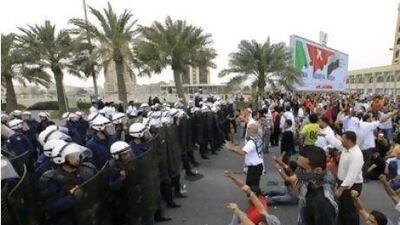Bahrain's stock market was forced to move to emergency premises at dawn yesterday as hundreds of protesters blocked access to its Financial Harbour office.
Share trading continued, but with volumes only 20 to 30 per cent of normal levels. Ali al Mansori, an exchange spokesman, said it was too early to say if business would resume in the Financial Harbour today.
Demonstrators seriously disrupted normal business in Bahrain with a targeted move against Manama's Financial Harbour district, the heart of the country's investment and banking industry.
Many workers were unable to get to their desks as demonstrators erected barricades across some of the city's busiest roads and picketed the twin towers of the Financial Harbour.
Police responded by sealing off major roads and tackling the protesters with tear gas and rubber bullets.
The Bahrain All Share Index closed 0.44 per cent higher at 1,417 points.
At midday, the normally bustling King Faisal Highway by the Financial Harbour was eerily deserted. Isolated groups of demonstrators were still shouting angrily at lines of riot police while attempting to replace barriers the security forces had removed earlier in the morning.
There was also the constant buzz of helicopters circling the nearby Pearl roundabout, the main focus of the protests so far, and the Seef commercial district.
The area around the Bahrain central bank and finance ministry was protected by a heavy police presence extending to the diplomatic district, which continued into the early evening. Police blocked all vehicle access to the Financial Harbour, but allowed some pedestrians.
A government statement said protesters had planned to close all access to the area and had attacked unarmed officers, before the police took action.
There were no official estimates of numbers of demonstrators. It was the most concerted move yet against Bahrain's business district.
The Financial Harbour project itself has been the centre of allegations of corruption by Bahraini officials, which have been denied.
For the past week, protesters have spread out from Pearl Square to other parts of the central downtown district and pitched tents.
International ratings agencies have downgraded, or placed on review, Bahrain sovereign debt and several banks based in the kingdom since the demonstrations began last month. Rasheed al Maraj, the governor of the central bank, said last week the banking system was operating normally and the kingdom was still on track for a US$1 billion (Dh3.67bn) bond issue.
The Bahrain market has fallen 3.7 per cent since the end of January, when uprisings in Egypt forced the closure of the Egyptian stock exchange and led markets across the Mena region to fall sharply.
Bahrain's drop was relatively small compared with its bigger peers in Dubai and Kuwait, which both slid more than 7 per cent since the end of January.

